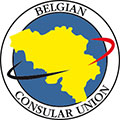Article 1
The Belgian Consular Union (BCU) is an unincorporated association which brings together and represents the honorary consuls accredited to Belgium.
Article 2
The BCU has 4 categories of members.
1) Effective members are Honorary Consuls accredited to Belgium
and up-to-date in regard to membership payments. They have
the right to vote and to be elected to office.
2) Belgian Honorary Consuls abroad are associate members when
they are up-to-date in regard to membership payments.
3) Honorary members are former Honorary Consuls who wish to continue
involvement in its activities when they are up-to-date in regard to
membership payments. They are invited to all public events which are
organized under BCU’s responsibility. Further, the Administrative Council
could request them to take a more active part if deemed necessary,
demonstrating the usefulness of their involvement.
4) Persons who have rendered services and who have been elected by the
General Assembly on a proposal by the Administrative Council, may be made
Honorary members.
Article 3
The BCU members intend to serve the legitimate interests of the nationals of the Sending State as well as those under their consular jurisdiction. BCU members seek to achieve optimum implementation of the functions set out in the Vienna Convention of 24th April 1963. For this purpose, BCU ensures the development of relations among Honorary Consuls as well as mutual exchange of information to strengthen economic, cultural, educational and social initiatives between the Sending State and Receiving State. BCU ensures that its statutes and dignity of Honorary Consuls are respected.
Article 4
The General Assembly is the supreme decision making body. All the members are convened in such an assembly at least once a year. Only effective members have the right to vote and to be elected to office, at such a meeting. All decisions shall be taken by a majority of votes cast, but the primary customary rule, shall be to seek a consensus. The General Assembly shall take decisions regarding release of administrative office bearers from duties.
Article 5
The General Assembly elects the Board of Directors. It consists of twelve members and appoints from among its members a six-member executive. Three from the Consular Corps from the Flemish provinces and three from those from the Walloon provinces. If certain of our colleagues who are candidates for administrator posts, come from a province not having accredited consular corps, they would be from flemish Brabant attached to east Flanders and in the Brabant wallon attached to Namur, to Limbourg attached to Antwerp and in the Province of Luxembourg attached to Liege, while our Brussels colleagues would be attached to the former province of Brabant: Brabant wallon (and therefore Namur) if they are french-speaking and flemish Brabant (and therefore east Flanders) if they are dutch Speaking. Notice calling for applications to the Administrator posts due for renewal, is sent along with the dispatch of invitations for the Assembly. Names of out-going administrators, indicating their provincial corps and their desire to present themselves or not, are specified. All administrators can be re-elected but only applications for the post can be accepted from Honorary Consuls of provincial consular corps who have at least one out-going Administrator. The term of office of an Administrator is of four-year duration, half the members of the Council, being due for renewal every two years. The Administrative Council can invite the Honorary Consuls or their representatives to a meeting, if their presence is deemed useful. The latter don’t have the right to vote (at such meetings). The mandate is conferred on them by a simple majority vote. The Executive body of the Administrative Council is composed of a President, two Vice Presidents, a Secretary general, a Treasurer, and a person in charge of Protocol. The Secretary General submits a report on the activities during the past year, the Treasurer clarifies the financial situation, and the President submits proposals for activities and action plans for the new year.
Article 6
The Administrative Council meets regularly to ensure good management of activities, determine annually the membership fee, provides for a website with the latest digital data and/or honorary consular papers, maintains contact with the members by internet, with the quarterly BCU NEWS FLASH. It continues close cooperation with the SPF of Foreign Affairs, for exchange of information as well as for mutual consultation and coordination. The Administrative Council is in charge of conferring an annual Award (*)
Article 7
BCU is member of the Federation of European Union of Honorary Consuls (FUECH) at European level and at the global level, of the International Federation of Consular Corps and Associations (FICAC) also known as World Federation of Consuls. At the Provincial and Municipal level, it is the Provincial Consular Corps that have competence. At the regional and (European) community levels, the BCU administrators , coming from the Provincial Consular Corps, if the latter so desire, have the faculty to represent, within the framework of the BCU, the Honorary Consuls of their region, in the areas of economy, social aspects, culture and education.
( * ) At present it is the Michele Di Gianni-Award, named after the Italian Consul-General of Japan in Naples, who in 1993 inspired the creation of the BCU.
This award is conferred to a person or to an association who had an international and remarkable career .


